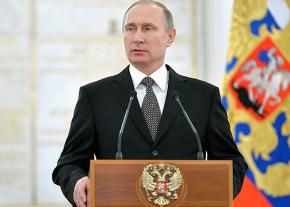Russia’s reaction to the Trump earthquake
One of the most unusual features of a very unusual presidential campaign last fall was the Republican presidential nominee's open admiration for the authoritarian Russian leader Vladimir Putin--even as Putin and Russia were escalating their maneuvers in the ongoing imperial conflict with the U.S. During the candidate debates, Hillary Clinton accused Trump of being in a secret alliance with a Russian government that was hacking the e-mail accounts of Democratic leaders.
In the aftermath of Trump's victory, the reaction in Russia is more complicated and convoluted, as explains in this report commentary from Moscow.
IVAN IS 62 years old and a taxi driver in Moscow. He is already receiving a pension, but it isn't enough for him to live on. His concerns are the development of the new Yandex.ru taxi service--a Russian variant of Uber--that reduced his income from driving by 30 percent last year, and also his daughter's difficulties in finding a decent job.
Two years of recession have reduced the country's gross domestic product by about 5 percent, so the decline in wages is the main problem experienced today, not only for the working class but also for the middle class.
When I ask him what he thinks about Donald's Trump's victory in the U.S. presidential election, however, Ivan smiles. "It's good news!" he says. "He will make peace with Russia and dissolve NATO. And he's a real man--he has sex with a bunch of women, not like Obama, who participated in gay pride!"
If you ask around in Moscow, such opinions are common not only among men, but also women. There is disillusionment and despair among the Russian population today at the social crisis that Putin has presided over--turnout for parliamentary elections in Moscow last September was just 28.7 percent. But nationalistic, xenophobic, anti-Muslim and anti-gay ideologies continue to have a strong hold--thus, the appeal of Trump.

RUSSIAN NEWSPAPERS, on the other hand, are more cautious about the impact of Trump's victory.
Commentator Viktoria Zhuraleva predicted in Vedomosti on November 16 that Trump's foreign policy wouldn't be positive for Russia. "Against him is the majority of the Republican Party, the Pentagon, the CIA and the State Department," Zhuraleva wrote. "There may not be any improvement in relations with Moscow. The best Trump may be able to do in this situation is block only even more aggressive measures."
The Russian press is having difficulty with predicting the line of the new president. An unsigned editorial in the pro-government newspaper Nezavisimaya Gazeta wrote about the consequences for Ukraine, still embroiled in a conflict between a pro-Western central government and pro-Russian political and military forces in the east.
"Trump could come to a recognition of the de facto annexation of the Crimea and an easing of NATO pressure in the Baltic countries in exchange for Putin abandoning the Donetsk People's Republic [a base of pro-Russian influence in eastern Ukraine] to its fate. This scenario, however, would be difficult for Moscow to accept."
In Komsomolskaya Pravda, economist Vladislav Inozemtsev wrote that Trump could be a new Ronald Reagan.
"In foreign policy," Inozemtsev wrote, "we should not expect an abrupt change of course by Trump. On the contrary, his economic program...would be to raise interest rates and keep down the price of oil, which would not be good for Russia. It seems to me that the Republicans gathered around Trump are more likely to pursue a course like Ronald Reagan did."
In Ukraine, however, the reaction was fear: President Petro Poroshenko fears that a Trump-Putin alliance would crush Ukraine. He called on Trump to resist Russian aggression. In the three days after the election, Ukraine's currency, the hryvnia, lost 10 percent of its value against the dollar.
The Kremlin itself has been silent since Putin's phone call to Trump to congratulate him on his victory. But Putin has had much to celebrate besides what happened in the U.S.
In Moldova and Bulgaria, elections were won by the two pro-Russian candidates. Putin expects the re-run presidential election in Austria early next month 2 will produce a victory for the far-right populist candidate who is anti-European. After that, he can dream of a 2017 in which National Front leader Marine Le Pen, another important ally of Cremlino, win the presidency of France.


